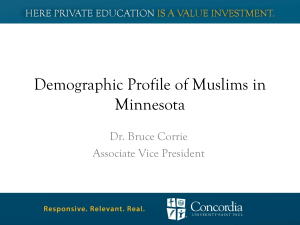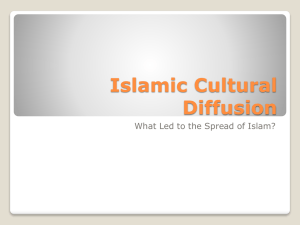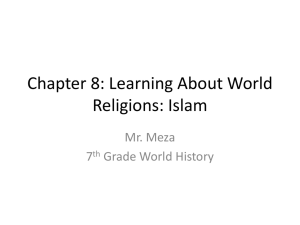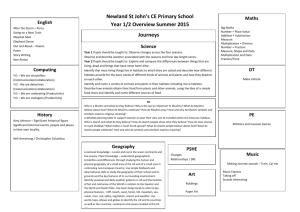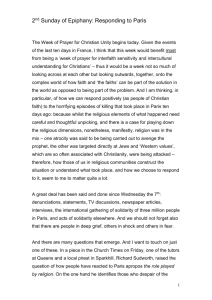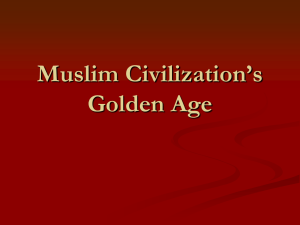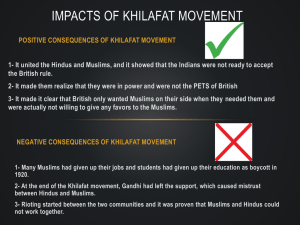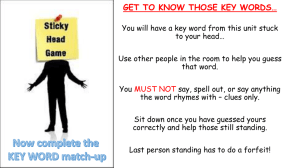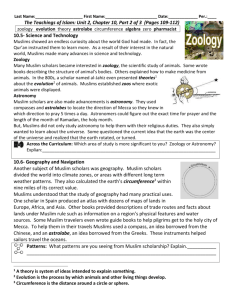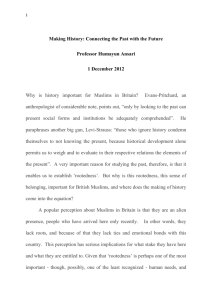Myriam Francois-Cerrah - Franco
advertisement
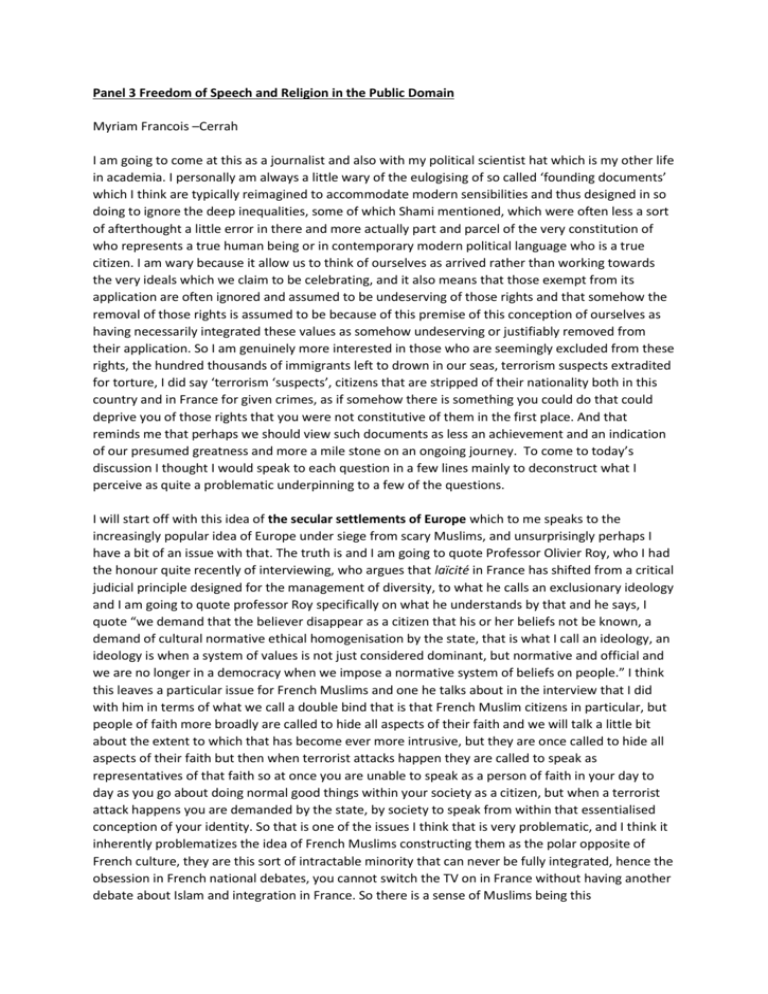
Panel 3 Freedom of Speech and Religion in the Public Domain Myriam Francois –Cerrah I am going to come at this as a journalist and also with my political scientist hat which is my other life in academia. I personally am always a little wary of the eulogising of so called ‘founding documents’ which I think are typically reimagined to accommodate modern sensibilities and thus designed in so doing to ignore the deep inequalities, some of which Shami mentioned, which were often less a sort of afterthought a little error in there and more actually part and parcel of the very constitution of who represents a true human being or in contemporary modern political language who is a true citizen. I am wary because it allow us to think of ourselves as arrived rather than working towards the very ideals which we claim to be celebrating, and it also means that those exempt from its application are often ignored and assumed to be undeserving of those rights and that somehow the removal of those rights is assumed to be because of this premise of this conception of ourselves as having necessarily integrated these values as somehow undeserving or justifiably removed from their application. So I am genuinely more interested in those who are seemingly excluded from these rights, the hundred thousands of immigrants left to drown in our seas, terrorism suspects extradited for torture, I did say ‘terrorism ‘suspects’, citizens that are stripped of their nationality both in this country and in France for given crimes, as if somehow there is something you could do that could deprive you of those rights that you were not constitutive of them in the first place. And that reminds me that perhaps we should view such documents as less an achievement and an indication of our presumed greatness and more a mile stone on an ongoing journey. To come to today’s discussion I thought I would speak to each question in a few lines mainly to deconstruct what I perceive as quite a problematic underpinning to a few of the questions. I will start off with this idea of the secular settlements of Europe which to me speaks to the increasingly popular idea of Europe under siege from scary Muslims, and unsurprisingly perhaps I have a bit of an issue with that. The truth is and I am going to quote Professor Olivier Roy, who I had the honour quite recently of interviewing, who argues that laïcité in France has shifted from a critical judicial principle designed for the management of diversity, to what he calls an exclusionary ideology and I am going to quote professor Roy specifically on what he understands by that and he says, I quote “we demand that the believer disappear as a citizen that his or her beliefs not be known, a demand of cultural normative ethical homogenisation by the state, that is what I call an ideology, an ideology is when a system of values is not just considered dominant, but normative and official and we are no longer in a democracy when we impose a normative system of beliefs on people.” I think this leaves a particular issue for French Muslims and one he talks about in the interview that I did with him in terms of what we call a double bind that is that French Muslim citizens in particular, but people of faith more broadly are called to hide all aspects of their faith and we will talk a little bit about the extent to which that has become ever more intrusive, but they are once called to hide all aspects of their faith but then when terrorist attacks happen they are called to speak as representatives of that faith so at once you are unable to speak as a person of faith in your day to day as you go about doing normal good things within your society as a citizen, but when a terrorist attack happens you are demanded by the state, by society to speak from within that essentialised conception of your identity. So that is one of the issues I think that is very problematic, and I think it inherently problematizes the idea of French Muslims constructing them as the polar opposite of French culture, they are this sort of intractable minority that can never be fully integrated, hence the obsession in French national debates, you cannot switch the TV on in France without having another debate about Islam and integration in France. So there is a sense of Muslims being this inherent challenge to French culture, when in truth French Muslims have been part and parcel of French culture, part and parcel of constructing French culture for generations now and maybe it is about time we stopped asking them to justify that. Do religions have a legitimate right to be exempted from special treatment? I do not actually think that is the issue, rather than exemption I think maybe an inclusive conception of society might be more beneficial. I think more often than not we assume that religious folk want differential treatment when actually what they want is to have the same treatment and not be the victims of prejudice. Take the Rushdie affair, which people always refer to as the landmark issue in Europe, the protest that happened in England during the Rushdie affair were calls for the application of the same blasphemy laws which existed in this country until 2008 I believe to all citizens, including Muslim citizens. So they were the calls to the application of the same rights for all citizens, they were not calls for an exemption or for some sort of special treatment, in fact it might be nice not to have special treatment for a lot of people of faith, because it is not that special most of the time. Freedom of expression and the protection of religious feelings There are huge national differences on the conceptions of freedom of expression, I often come into discussions on this and if people are not familiar with the French setting its worth pointing out that there are pretty significant restrictions on free speech in France already, some of which might shock an Anglo-Saxon audience. I am not convinced that religions are the issue that pose the greatest threat to the freedom of speech in France or here in the UK for that matter. Just last year a French court fined a blogger and ordered her to change her headline to reduce its prominence on google for a negative review of a restaurant, it is also worth pointing out that Charb did face threats from Muslim extremists but do you know what he also faced? Threats of criminal prosecution, for some of the things he said. So I think free speech is certainly an issue I am just not convinced that it’s the big bad Muslims that are the problem. I would rather ask whether the ideology that Professor Roy refers to, and specifically the political instrumentalisation of the concept of laïcité is not being used to overrule the civil rights of religious citizens, when a Jewish man in a Kippah come to a polling station and is turned away under the guise of laïcité, you need to question whether the civil rights are being applied to all citizens equally. Similarly now we have French citizens who are excluded from public spaces, from schools, from universities, from hospitals, from using public transport, I call that a civil liberties issue, and essentially to me the real civil rights issue is the profound racism that exists in France today, where there are huge inequalities when it comes to access to housing, to access to power even access to funding religious organisations it is worth pointing out there is still a Christian bias in that sense, a Christian citizens is two and a half times more likely to get a job interview in France than an equally qualified Muslim citizen according to a study by Stanford University not that long ago. I think there are numerous indications from human rights organisations including Amnesty International that have pointed to a climate of what I would call pervasive discrimination against Muslin citizens in particular. To come back specifically to the issue that everyone wants to talk about and this is the attacks on Charlie Hebdo, I would make a lot more about the fact that, this discussion is usually framed as Muslims being offended by cartoons. Actually a lot of Muslims were offended by images but a lot of Muslims did not rock up to the offices and to a Kosher store and shoot people. I will end that by saying that actually and I think on this one the philosopher Slavoj Zizek has it right when he says that the Muslim crowds did not react to Mohammed caricatures as such, they reacted to the complex figure or image of the West that was perceived as the attitude behind the caricatures. Thank you for your time.

